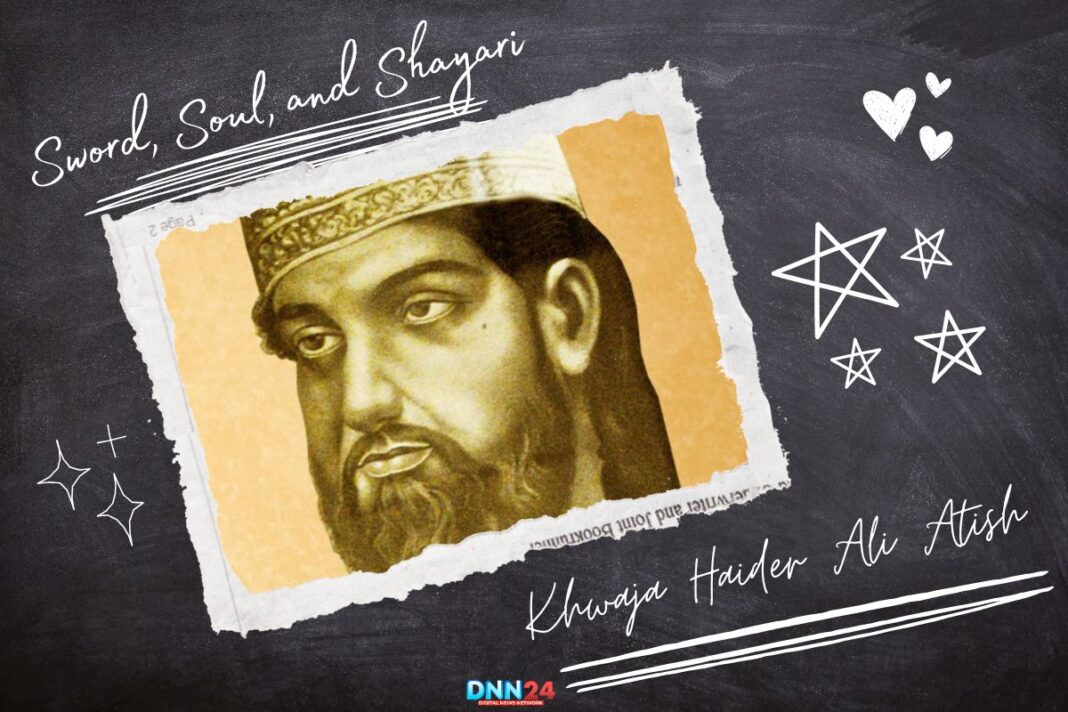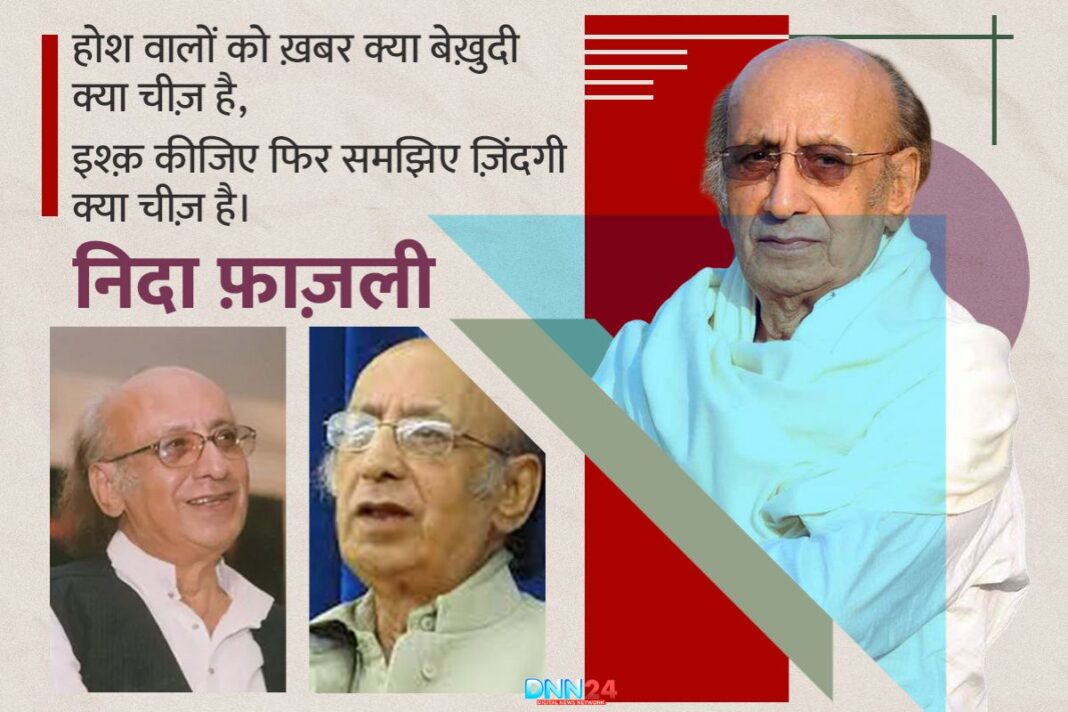The lanes of Faizabad, soft shelters of history, saw the birth of a child who would later bring fire to the world of Urdu poetry with his pen. Khwaja Haider Ali Atish, whose very name means “fireworks,” entered this world in 1778, when Awadh was a melting pot of cultures, languages, and dreams. His family origins were in Baghdad; via Delhi, they landed in Faizabad in search of peace and meaning.
ye aarzu thi tujhe gul ke ru-ba-ru karte
Khwaja Haider Ali Atish
hum aur bulbul-e-betab guftugu karte
payambar na mayassar hua to KHub hua
zaban-e-ghair se kya sharh-e-arzu karte
meri tarah se mah-o-mehr bhi hain aawara
kisi habib ki ye bhi hain justuju karte
However, as life has a habit of doing, it threw young Atish a challenge at an early age. His father, Khwaja Ali Bakhsh, died when Atish was a small boy, and he was left to the mercies of fate and the joy of strangers. Formal education fell through his hands, but poetry lingered like a cherished tune in his heart. With no father to guide Atish, words, the music of ghazals, and the friendship of soldiers became his refuge- he not only learnt the art of the sword but also the art of living. And though he smote the steel, his soul was chanting rhymes, and the world started to be a fire at the spark.
ai sanam jis ne tujhe chaand sii suurat dii hai
Khwaja Haider Ali Atish
usii allah ne mujh ko bhii mohabbat dii hai
Lucknow: City of Dreams and Rivalries
When Nawab Mirza Muhammad Taqi, a poet and patron, shifted to Lucknow, the young Atish was taken under the wings. Lucknow was the pulsating Urdu literary center with its large courts and mushairas, and it was here that Atish’s fate played out. He was a follower of Mushafi, the well-known poet, and he quickly made his own mark in the city’s literature circles. But Atish did not rest satisfied with living in reflected splendor.
sun to sahi jahan mein hai tera fasana kya
Khwaja Haider Ali Atish
kahti hai tujh ko KHalq-e-KHuda ghaebana kya
kya kya ulajhta hai teri zulfon ke tar se
baKHiya-talab hai sina-e-sad-chaak shana kya
zer-e-zamin se aata hai jo gul so zar-ba-kaf
qarun ne raste mein luTaya KHazana kya
He was also incredibly independent and would not be tied to any court or king. Dignity, self-respect and the unwillingness to kowtow before power characterized his poetry as it characterized his life. Lucknow is where the legendary rivalry of Atish with Imam Baksh Nasikh flowered–a rivalry that was to make an era and bring Urdu poetry to a new eminence. Their poetic fights were the topic of the town, every verse a challenge, every ghazal a statement of a genius. The city stood fascinated as these two giants nursed the words, and their competition was a golden fiber in the cultural history of Lucknow.
jo aalaa-zarf hote hain hameshaa jhuk ke milte hain
Khwaja Haider Ali Atish
suraahii sar-niguuñ ho kar bharaa kartii hai paimaanaa
A Simple Life: The Fakir Poet of Awadh
Atish led a modest life even though he was famous. He lived in a small thatched hut on a plain jute mat, rejecting luxuries his genius might have readily obtained. And when poverty knocked at his gate, He would not go Groveling to the great. On the contrary, whatever small amount he got in the royal court, he distributed his heart as open as his verses among the poor and needy.
hawa-e-daur-e-mai-e-KHush-gawar rah mein hai
Khwaja Haider Ali Atish
KHizan chaman se hai jati bahaar rah mein hai
gada-nawaz koi shahsawar rah mein hai
buland aaj nihayat ghubar rah mein hai
adam ke kuch ki lazim hai fikr hasti mein
na koi shahr na koi dayar rah mein hai
In a world where everyone is status-conscious and wealthy, Atish was a real fakir who was happy with nothing but wealth inside. And this simplicity was found in his poetry- words like pearls, strung together, emotions bare and unvarnished, appealing directly to the heart of every listener.
na gor-e-sikandar na hai qabr-e-daaraa
Khwaja Haider Ali Atish
miTe naamiyoñ ke nishaañ kaise kaise
The Sufi in Atish viewed humanity as his primary concern. He preached love, tolerance, and the breakdown of barriers. He considered the heart God’s dwelling place, more holy than a temple or mosque.
baḌaa shor sunte the pahlū meñ dil kaa
Khwaja Haider Ali Atish
jo chiiraa to ik qatra-e-ḳhuuñ na niklaa
Unheard Tales: The Sword and the Pen
The life of any poet is a treasure trove of untold stories, and the life of Atish is no exception. Not many are aware that, before poetry took possession of him, Atish was a skillful swordsman and made his living in the courts as a soldier. His sword was said to move with the same ease as his pen, and they were all testimonies of his discipline and artistry.
magar us ko fareb-e-nargis-e-mastana aata hai
Khwaja Haider Ali Atish
ulaTti hain safen gardish mein jab paimana aata hai
nihayat dil ko hai marghub bosa KHal-e-mushkin ka
dahan tak apne kab tak dekhiye ye dana aata hai
A story is sometimes told in the old parts of Lucknow: There was a time when, at a mushaira, a nobleman jeered at his mean dress, at which Atish made no angry rejoinder but a couplet so keen and witty that the company could not clap enough, and the nobleman bowed and acknowledged his shame. And such was the power of the words of Atish–they were sharper than any knife but made whole again by their loveliness.
but-khaana toD Daaliye masjid ko Dhaa.iye
Khwaja Haider Ali Atish
dil ko na toDiye ye KHudaa kaa maqaam hai
Another less frequently known story is how he refused to go to King Mohammad Ali Shah to seek financial assistance even during his darkest days. His treasures consisted of pride and self-respect. In his later years, when his eyes lost sight, and the world became dark, Atish could no longer stand the city’s busy life, and he lived in silence and meditation. But his students, including the renowned Pandit Daya Shankar Naseem, kept his memory alive, and the light of Atish would never go out.
shab-e-wasl thi chandni ka saman tha
Khwaja Haider Ali Atish
baghal mein sanam tha KHuda mehrban tha
mubarak shab-e-qadr se bhi wo shab thi
sahar tak mah o mushtari ka qiran tha
wo shab thi ki thi raushni jis mein din ki
zamin par se ek nur ta aasman tha
Eternal Flame of the Ghazal: Live On Poetry
Atish’s poems are a tango of desire and disappointment, of sufferance and joy. He wrote in Persian and Urdu, and his Urdu ghazals have stood the test of time, whose words have resonated in the ears of lovers and dreamers. Simple and profound at the same time, his verses are a world in a couplet.
ajab terii hai ai mahbuub suurat
Khwaja Haider Ali Atish
nazar se gir gaye sab KHuubsuurat
Atish penetrated to the bottom of the human feeling, to the painfulness of parting, to the intensity of reunion, to the pride of pain, to the happiness of giving in. He had no fear of breaking the conventions of his era, and through poetry, he protested against the evils of feudal society and praised the strength of the human spirit.
ye aarzu thi tujhe gul ke ru-ba-ru karte
Khwaja Haider Ali Atish
hum aur bulbul-e-betab guftugu karte
payambar na mayassar hua to KHub hua
zaban-e-ghair se kya sharh-e-arzu karte
meri tarah se mah-o-mehr bhi hain aawara
kisi habib ki ye bhi hain justuju karte
With the soil of Lucknow as his home, his words spread far and wide and touched the hearts of all who cherish beauty, truth, and courage. No one knows the exact place where his grave is located today, but his poetry will live forever—a light that guides those who seek meaning in the confusion of life.
kuchh nazar aataa nahiiñ us ke tasavvur ke sivaa
Khwaja Haider Ali Atish
hasrat-e-diidaar ne aańkhoñ ko andhaa kar diyaa
Legacy: The Fire Still Burns
Khwaja Haider Ali Atish passed away in Lucknow in 1846, his final years marked by solitude and silence. But the fire he kindled still burns, his poems are recited in mushairas, and his name is murmured in awe. He was not just a poet but an epitome of integrity, modesty, and the indomitable spirit of Awadh. The life of Atish teaches us that greatness is not quantified in terms of money and authority but by the strength to be oneself, to speak truth to authority, and to love unconditionally.
yar ko main ne mujhe yar ne sone na diya
Khwaja Haider Ali Atish
raat bhar tale-e-be-dar ne sone na diya
KHak par sang-e-dar-e-yar ne sone na diya
dhup mein saya-e-diwar ne sone na diya
sham se wasl ki shab aankh na jhapki ta-subh
shadi-e-daulat-e-didar ne sone na diya
Atish was not merely a Lucknow poet—he was the conscience of Lucknow, the pulse of Lucknow, its ever-burning flame. His sorrowful and joyous, struggle and triumphant story is a miracle of the word. As long as there are hearts that desire beauty, the fire of Atish will never die.
Also Read: The Quiet Storm: The Life and Soul of Shamsher Bahadur Singh
You can connect with DNN24 on Facebook, Twitter, and Instagram and subscribe to our YouTube channel.



